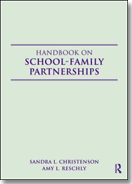The Harvard Family Research Project separated from the Harvard Graduate School of Education to become the Global Family Research Project as of January 1, 2017. It is no longer affiliated with Harvard University.

|
May 2009 From Periphery to Center: A New Vision for Family, School, and Community PartnershipsHeather B. Weiss, Naomi Stephen |
Article Information
- Full Text (HTML)
- Full Text (PDF: 101 kb)
FINE: The Family Involvement Network of Educators
![]() The FINE Newsletter shares the newest and best family involvement research and resources from HFRP and other field leaders.
The FINE Newsletter shares the newest and best family involvement research and resources from HFRP and other field leaders.
FINE Newsletter, Volume I, Issue 2
Issue Topic: Family Involvement Policy
Resources & Research From Harvard Family Research Project
Written by Harvard Family Research Project's Heather Weiss and Naomi Stephen, this chapter—which appears in the Handbook of School–Family Partnerships, edited by Sandy Christenson, Ph.D. and Amy Reschley, Ph.D.—presents a comprehensive, integrated family, school, and community partnership framework that can help level the playing field for disadvantaged children and ensure that they have access to the parental involvement and community engagement practices of their more advantaged peers in order to enhance their learning.
The authors discuss the strong developmental research case for family–school–community partnerships and emphasize the need for continued evaluations to demonstrate the types of partnerships and involvement practices that are best correlated with positive student outcomes. Instead of narrowly defining education reform as initiatives that take place within the walls of K–12 school buildings, Weiss and Stephen argue for the need to address the wide range of external factors that influence children’s learning success, and illustrate how family–school–community partnerships provide opportunities to broaden our definition of schooling and understanding about where learning takes place.
Focusing on the need to combine governmental and nongovernmental supports to develop more comprehensive and continuous partnership efforts, the chapter proposes a set of recommendations for moving ahead on a national strategy to support family–school–community partnerships, including:
-
Building strategic and coherent advocacy efforts through a broad national leadership coalition of organizations and individuals in order to help increase the likelihood of sustained legislation and public support
-
Developing integrated infrastructure supports via national and state legislation, policies, and funding with earmarks for key infrastructure supports, such as training, technical assistance, and performance monitoring and evaluation
-
Strengthening and utilizing practitioner–private sector partnerships as a resource for training, innovative tool development, and other infrastructure supports
-
Providing training frameworks and other supports for pre- and in-service professional development
-
Conducting more rigorous evaluations, including longitudinal studies, in the family involvement and partnership field to strengthen the research and evaluation base for family–school–community partnership efforts
-
Contributing to knowledge development and innovation through promoting the research and development infrastructure for school improvement and increasing practitioners’ ability to get and use data to improve their practices
This resource is part of the May 2009 FINE Newsletter. The FINE Newsletter shares the newest and best family involvement research and resources from Harvard Family Research Project and other field leaders. To access the FINE Newsletter Archive, visit www.hfrp.org/FINENewsletter.
Free. Available online only.
